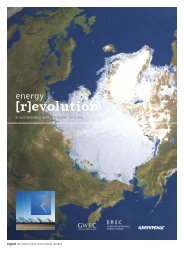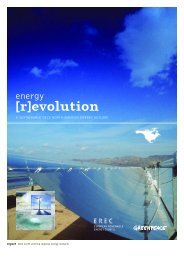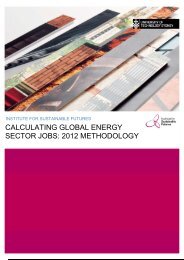download the mexico energy revolution scenario
download the mexico energy revolution scenario
download the mexico energy revolution scenario
Create successful ePaper yourself
Turn your PDF publications into a flip-book with our unique Google optimized e-Paper software.
WORLD ENERGY [R]EVOLUTION<br />
A SUSTAINABLE ENERGY OUTLOOK<br />
6<br />
key results | CO2 EMISSIONS & PRIMARY ENERGY CONSUMPTION<br />
development of CO2 emissions<br />
Whilst Mexico’s emissions of CO2 will increase by 166% under <strong>the</strong><br />
Reference <strong>scenario</strong>, under <strong>the</strong> Energy [R]evolution <strong>scenario</strong> <strong>the</strong>y will<br />
decrease from 397 million tons in 2007 to 180 million tons in<br />
2050. Annual per capita emissions will drop from 3.7 tons to 1.4<br />
tons. In spite of <strong>the</strong> phasing out of nuclear <strong>energy</strong> and increasing<br />
demand, CO2 emissions will decrease in <strong>the</strong> electricity sector. In <strong>the</strong><br />
long run efficiency gains and <strong>the</strong> increased use of renewable<br />
electricity in <strong>the</strong> transport sector will even reduce CO2 emissions.<br />
With a share of 45% of total CO2, <strong>the</strong> transport sector will be <strong>the</strong><br />
largest source of emissions in 2050. The advanced Energy<br />
[R]evolution <strong>scenario</strong> reduces <strong>energy</strong> related CO2 emissions over a<br />
period ten to 15 years faster than <strong>the</strong> basic <strong>scenario</strong>, leading to<br />
2.3 tons per capita by 2030 and 0.5 tons by 2050. By 2050,<br />
Mexico’s CO2 emissions are 77% below 1990 levels.<br />
primary <strong>energy</strong> consumption<br />
Taking into account <strong>the</strong> assumptions discussed above, <strong>the</strong> resulting<br />
primary <strong>energy</strong> consumption under <strong>the</strong> Energy Revolution Scenario is<br />
shown in Figure 6.9. Compared to <strong>the</strong> Reference Scenario, overall<br />
<strong>energy</strong> demand will be reduced to 49% in 2050. Around 62% of <strong>the</strong><br />
remaining demand will be covered by renewable <strong>energy</strong> sources<br />
The advanced version phases out coal and oil about ten to 15 years<br />
faster than <strong>the</strong> basic <strong>scenario</strong>. This is made possible mainly by <strong>the</strong><br />
replacement of new coal power plants with renewables after a 20 ra<strong>the</strong>r<br />
than 40 year lifetime and a faster introduction of electric vehicles in <strong>the</strong><br />
transport sector to replace oil combustion engines. This leads to an<br />
overall renewable <strong>energy</strong> share of 41% in 2030 and 82% in 2050.<br />
Nuclear power is phased out in both Energy [R]evolution <strong>scenario</strong>s soon<br />
after 2040.<br />
figure 6.8: development of CO2 emissions by sector under<br />
both <strong>energy</strong> [r]evolution <strong>scenario</strong>s<br />
Mil t/a<br />
1,100<br />
1,000<br />
900<br />
800<br />
700<br />
600<br />
500<br />
400<br />
300<br />
200<br />
100<br />
0<br />
E[R] adv<br />
E[R]<br />
E[R] adv<br />
E[R]<br />
E[R] adv<br />
E[R]<br />
E[R] adv<br />
E[R]<br />
E[R] adv<br />
E[R]<br />
2007 2015 2020 2030 2040<br />
POPULATION DEVELOPMENT<br />
SAVINGS FROM ‘EFFICIENCY’ & RENEWABLES<br />
OTHER SECTORS<br />
INDUSTRY<br />
• TRANSPORT<br />
PUBLIC ELECTRICITY & CHP<br />
E[R] adv<br />
E[R]<br />
2050<br />
Million<br />
people<br />
140<br />
120<br />
100<br />
80<br />
60<br />
40<br />
20<br />
0<br />
figure 6.9: development of primary <strong>energy</strong> consumption under three <strong>scenario</strong>s<br />
18,000<br />
16,000<br />
14,000<br />
12,000<br />
10,000<br />
8,000<br />
6,000<br />
4,000<br />
2,000<br />
PJ/a 0<br />
REF E[R]<br />
adv<br />
E[R]<br />
REF E[R]<br />
adv<br />
E[R]<br />
REF E[R]<br />
adv<br />
E[R]<br />
REF E[R]<br />
adv<br />
E[R]<br />
REF E[R]<br />
adv<br />
E[R]<br />
REF E[R]<br />
adv<br />
E[R]<br />
‘EFFICIENCY’<br />
OCEAN ENERGY<br />
GEOTHERMAL<br />
SOLAR<br />
BIOMASS<br />
WIND<br />
HYDRO<br />
NATURAL GAS<br />
OIL<br />
• COAL<br />
NUCLEAR<br />
2007<br />
2015<br />
2020<br />
2030<br />
2040<br />
2050<br />
64



![Energy [R]evolution - European Commission](https://img.yumpu.com/49109324/1/184x260/energy-revolution-european-commission.jpg?quality=85)


![5905 gp [eu rev]csfr4.qxd - Energy [R]evolution](https://img.yumpu.com/42305023/1/184x260/5905-gp-eu-revcsfr4qxd-energy-revolution.jpg?quality=85)


![5905 gp [eu rev]csfr4.qxd - Energy [R]evolution](https://img.yumpu.com/28729264/1/184x260/5905-gp-eu-revcsfr4qxd-energy-revolution.jpg?quality=85)